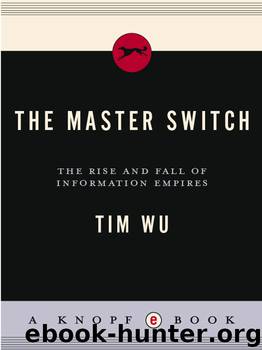The Master Switch by Tim Wu

Author:Tim Wu [Wu, Tim]
Language: eng
Format: epub
ISBN: 978-0-307-59465-5
Publisher: Knopf Doubleday Publishing Group
Published: 2010-11-01T16:00:00+00:00
As Friendly, Smith, and the others championed cable, its true white knight lurked unsuspected in the Nixon White House in the person of Clay Whitehead. At the age of thirty-two, Whitehead had been asked to lead the newly created Office of Telecommunications Policy, from which, working with a now less hostile FCC, he proceeded to launch the initiatives that would untether cable.
First among these was the creation of the Cabinet Committee on Cable Communications—which, as the name suggests, was a cabinet-level body appointed to decide the future of the cable industry. What’s less predictable, perhaps, is that the Nixon administration’s vision for cable was in some ways almost as idealistic as Friendly’s and Ralph Lee Smith’s. The administration, first of all, wanted to repeal the regulatory blocks imposed on the industry. Yet it also proposed a strict division between ownership of the cable lines and power over programming. The cable operator was to be granted discretion over the content of only one or two channels; the rest would be reserved for public interest programming, or freely available for lease by anyone. This arrangement the Nixon administration called its “separations policy.”13
One cannot fail to be impressed by the radicalism of the Nixon policy. Both in freeing the cable industry from geographical restrictions on its business and in denying both the federal government and the operators themselves any power over programming, the administration was evincing a hard-core libertarian streak not always associated with a White House that also spied on its enemies. It can’t be accounted for precisely. Possibly the Cabinet Committee’s views were really just those of Clay Whitehead, who, while believing in deregulation, tended to view the cable operators as no less a potential threat to diversity of speech than the government. This wariness of corporate power was also at the heart of his most famous initiative, the so-called Open Skies policy, which permitted any qualified company to launch a satellite, a technological shift that would liberate not only cable but long distance calling, too, as we shall see.*
Still, one cannot overlook President Nixon’s immediate and personal motivation to help out the cable industry. In an increasingly pernicious ecosystem of information created by his perceived enemies, the networks reporting on the war in Vietnam and Watergate, he had identified their natural predator. The president had already channeled considerable thought and emotion toward the goal of bringing down the networks and their news departments. The logic of giving new freedoms to the cable industry cannot conceivably have been lost on his ceaselessly strategizing mind. And so, unlikely as it may seem, the president better known for threatening the media—his attorney general would infamously warn The Washington Post that its publisher would “get her tit caught in the big fat wringer” if Robert Woodward and Carl Bernstein continued their explosive investigation—must be credited, in part, for one of the greatest liberalizations of media in postwar history, and for the launch of the cable industry. As a further irony, the Cabinet Committee’s so-called Whitehead Report would come out seven months before Nixon resigned his office.
Download
This site does not store any files on its server. We only index and link to content provided by other sites. Please contact the content providers to delete copyright contents if any and email us, we'll remove relevant links or contents immediately.
| Bookkeeping | Business Mathematics |
| Business Writing | Communications |
| Decision Making | Negotiating |
| Project Management | Running Meetings & Presentations |
| Secretarial Aids & Training | Time Management |
| Training |
Nudge - Improving Decisions about Health, Wealth, and Happiness by Thaler Sunstein(7707)
Deep Work by Cal Newport(7083)
Principles: Life and Work by Ray Dalio(6449)
The Doodle Revolution by Sunni Brown(4761)
Factfulness: Ten Reasons We're Wrong About the World – and Why Things Are Better Than You Think by Hans Rosling(4742)
Eat That Frog! by Brian Tracy(4540)
Thinking in Bets by Annie Duke(4227)
Hyperfocus by Chris Bailey(4118)
Visual Intelligence by Amy E. Herman(3782)
Writing Your Dissertation in Fifteen Minutes a Day by Joan Bolker(3729)
Ogilvy on Advertising by David Ogilvy(3622)
Hidden Persuasion: 33 psychological influence techniques in advertising by Marc Andrews & Matthijs van Leeuwen & Rick van Baaren(3565)
How to Win Friends and Influence People in the Digital Age by Dale Carnegie & Associates(3562)
How to win friends and influence people by Dale Carnegie(3474)
The Pixar Touch by David A. Price(3439)
Schaum's Quick Guide to Writing Great Short Stories by Margaret Lucke(3381)
Deep Work: Rules for Focused Success in a Distracted World by Cal Newport(3237)
Work Clean by Dan Charnas(3123)
The Slow Fix: Solve Problems, Work Smarter, and Live Better In a World Addicted to Speed by Carl Honore(3009)
